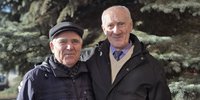The Case of Knyazev and Talipov in Izhevsk
Filter
- #
Investigator for especially important cases of the First Department for Investigation of Especially Important Cases of the Investigative Directorate of the Investigative Committee of Russia for the Udmurt Republic, Major of Justice Artur Selin, initiates a criminal case against Indus Talipov, Valery Knyazev and Aleksandr Stefanidin for organizing extremist activities.
- #
- #
Judge of the Industrial District Court of Izhevsk Aleksandr Shishkin chooses a preventive measure in the form of a ban on certain actions against Indus Talipov and Valeriy Knyazev, and sends Alexander Stefanidin to a pre-trial detention center.
- #
Judge of the Industrial District Court of Izhevsk I.A. Semenova satisfies the investigator's petition to seize the accounts and property of Valery Knyazev, Indus Talipov and Aleksandr Stefanidin. The investigator refers to Part 1 of Article 115 of the Criminal Procedure Code of the Russian Federation on the need to seize in order to ensure the execution of the sentence in terms of collecting a fine. Funds received and held in their bank accounts have already been seized from believers. The investigator also asks to arrest the share of the apartment owned by Stefanidin.
- #
Investigator A. A. Selin enforces the court decision to seize the property of believers. The arrest is imposed until the final procedural decision on the criminal case is made. The believers intend to appeal this decision.
- #
Aleksandr Stefanidin is kept in a double cell, sleeps on the lower tier. The chamber is warm and has hot water. His cellmate does not smoke. The administration treats Alexander with respect.
The believer does physical exercises to maintain his health, watches his diet and tries to walk more.
There is no grocery store on the territory of the pre-trial detention center yet, so Aleksandr is grateful for the parcels with food that are handed over to him. He has already received 330 letters of support from friends and caring people. They also sent him a Bible.
At the moment, the investigator is denying the believer and his wife visits and the opportunity to call each other. But despite all the difficulties, Aleksandr remains in a positive mood.
- #
The court placed Aleksandr Stefanidin under house arrest, rejecting the investigator's petition to extend his detention.
- #
The case is submitted to the Pervomaisky District Court of Izhevsk. It will be considered by judge Rustam Tagirov.
- #
Assistant Prosecutor E. V. Ivantsova reads out the indictment, with which the defendants do not agree.
Hindu Talipov draws the court's attention to the fact that the faith of Jehovah's Witnesses itself is not prohibited in Russia. He expresses confidence: "It should be obvious to the court between the confession of an unforbidden faith and extremism, which is completely alien to me."
Valery Knyazev voices his attitude to the prosecution: "The investigation believes that since I am a Jehovah's Witness, then by default I am an extremist. But that's not the case! I consider the initiation of a real criminal case... repressions."
Aleksandr Stefanidin considers the charges brought against him illegal, contradictory and far-fetched: "The indictment does not contain what manifestations of extremism, when and under what circumstances I could have committed... I had the impression that in order to avoid criminal liability, I should renounce my religious beliefs or stop expressing them. But this is nothing but discrimination."
15 people come to support the defendants.
- #
The Supreme Court of the Udmurt Republic replaces the preventive measure for Aleksandr Stefanidin with a ban on certain actions.
- #
The defense petitions for the declassification of the identity of witness Lozhkin and his interrogation in the courtroom in the general order. The prosecutor objects, the judge refuses.
The court is remotely interrogating Lozhkin, who attended meetings of Jehovah's Witnesses until 2019. He is confused in his testimony and asks to postpone the hearing due to a sharp deterioration in health. An ambulance is called for him. The meeting was postponed.
- #
The believers make their final statements. The judge pronounces the verdict.
Defendant Indus Talipov's last word in Izhevsk Defendant Valery Knyazev's last word in Izhevsk - #
Valeriy Knyazev and Indus Talipov are in SIZO No. 1 in Izhevsk. Valeriy is being held in a cell designed for four people, along with three convicts. Prisoners smoke, but out of respect for the elderly person, they do it near the window. Upon arrival, he was given a lower bunk. The Indian is also the oldest in the cell, and he is treated with respect. The premises are warm, there is hot water. Believers try to go for walks.
Valeriy suffers from diabetes. He takes the necessary medications and receives special nutrition. The Indian's eyesight deteriorates greatly, one eye almost does not see. He also has hearing problems. Both men can see a doctor, and an examination at the hospital is scheduled for early next year.
Believers are trying to get used to the new realities of life. Valeriy was especially pleased with 67 letters from different countries. He tries to answer everything. He especially liked letters about Lake Baikal, Kamchatka, historical places and interesting biographies of people.
- #
Valeriy Knyazev is in the process of being transferred. Indus Talipov is in penal colony No. 5 for the Udmurt Republic.
- #
Valeriy Knyazev is in penal colony No. 5 in the Kirov Region.

